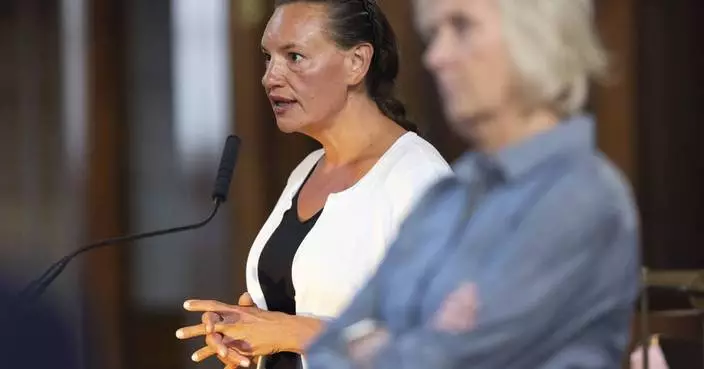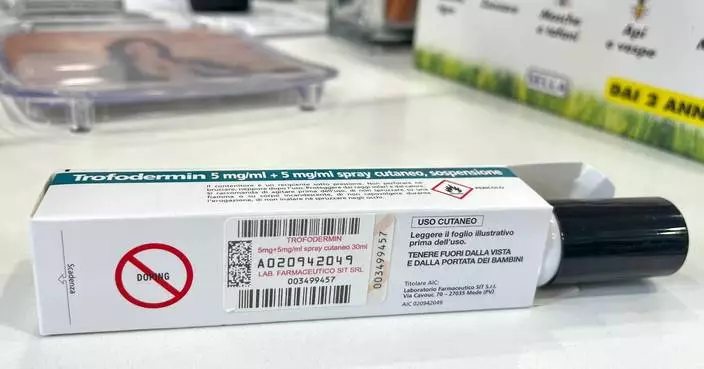It was about 2 a.m. on a moonless October night in 1987 when the police chief of a small northern Vermont town spotted a man carrying a black bag and walking down the railroad tracks from Canada toward a waiting van about a mile south of the border.
The man turned out to be linked to a Lebanese extremist group. And in his bag, later recovered from a ditch, were a ski mask and a propane-canister bomb.
Click to Gallery
It was about 2 a.m. on a moonless October night in 1987 when the police chief of a small northern Vermont town spotted a man carrying a black bag and walking down the railroad tracks from Canada toward a waiting van about a mile south of the border.
Whether it was luck or not, Jewett beat the odds in a way. While President Donald Trump, in arguing for a border wall, has said repeatedly that terrorists are slipping across from Mexico, known cases of extremists entering the U.S. through its land borders to the north or the south are exceedingly rare.
The only known terrorists who crossed illegally from Mexico in the 42-year span covered by the Cato study were three ethnic Albanians from Macedonia who came as children with their parents in 1984 and, in their 20s, were arrested in a foiled plot to attack the Army's Fort Dix in New Jersey, in 2007.
On the Canadian border, Ahmed Ressam was caught by border agents in December 1999 after he tried to enter the United States at Port Angeles, Washington, with bomb components in the trunk of his car. It was later determined Ressam planned to attack the Los Angeles airport during the millennium.
Worries about terrorists crossing from Canada have been reduced by the close cooperation between the two countries, and security has been tightened since 9/11. Hundreds more Border Patrol agents are stationed along the border (authorities won't disclose the total), surveillance has been enhanced with such things as electronic sensors and helicopters, and those trying to cross the border must show a passport or certain other documents, none of which were required before Sept. 11, 2001.
"If it had been two minutes later, they would have been in the van and gone on their way, and I'd have never known the difference," recalled Richford's long-retired police chief, Richard Jewett, who won numerous awards for apparently foiling an attack. "I guess luck was on my side."
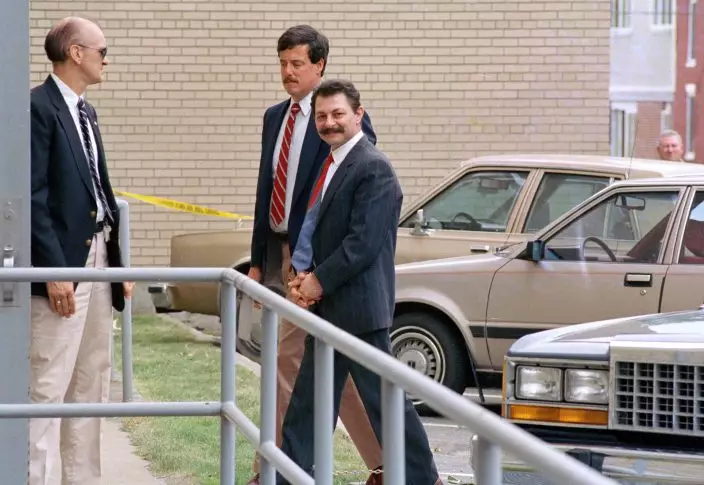
FILE - In this June 22, 1988 file photo, Georges Younan, right, one of three defendants of Lebanese descent from Montreal, Canada, is led into federal court in handcuffs in Burlington, Vt. Younan and the two others were caught smuggling the makings of a bomb into the U.S., on Oct. 23, 1987, in Richford, Vt. All three were convicted and sent to federal prison. (AP PhotoToby Talbot, File)
Whether it was luck or not, Jewett beat the odds in a way. While President Donald Trump, in arguing for a border wall, has said repeatedly that terrorists are slipping across from Mexico, known cases of extremists entering the U.S. through its land borders to the north or the south are exceedingly rare.
Even then, State Department reports on terrorism have expressed more concern about the Canadian border than the Mexican one because Canada, unlike Mexico, has been home to "violent extremists inspired by terrorist groups such as ISIS and al-Qaida and their affiliates and adherents," according to a 2017 paper.
A study issued last month by the libertarian Cato Institute found that between 1975 and 2017, seven people from "special interest" countries — states tied at least loosely to terrorism — were convicted of planning attacks on U.S. soil. Four of those individuals entered illegally from Canada, none from Mexico.
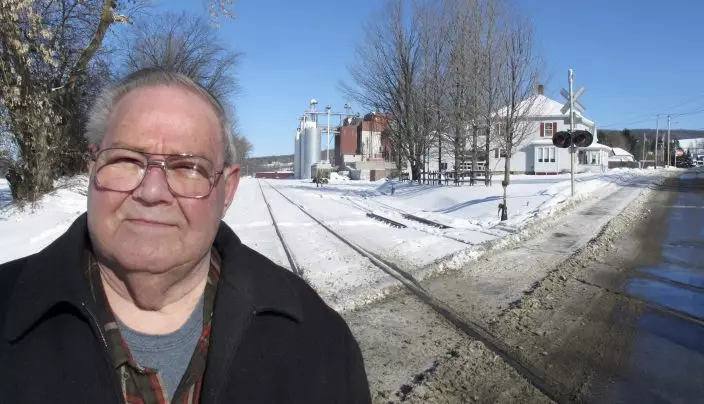
In this Jan. 17, 2019 photo, former town police chief Richard Jewett talks about the night in 1987 when he apprehended a man who carried a bomb across the border from Canada into the United States in Richford, Vt.. At a time when terrorism is part of the discussion about whether to build a wall on the U.S. southern border to protect the country, the Richford incident was the only one of its kind when anyone was caught trying to enter the United States illegally as part of a terrorist plot. (AP PhotoWilson Ring)
The only known terrorists who crossed illegally from Mexico in the 42-year span covered by the Cato study were three ethnic Albanians from Macedonia who came as children with their parents in 1984 and, in their 20s, were arrested in a foiled plot to attack the Army's Fort Dix in New Jersey, in 2007.
"This shows how rare it is for people to try to enter the U.S. illegally as terrorists by crossing a border," said Alex Nowrasteh, one of the authors of the Cato study. "It shows how Mexico is not how these folks typically try to enter and the terrorism justification for building the wall is probably the weakest."
In fact, most people with terroristic intent come into the country by air and are typically in the United States legally. The 19 men who carried out the 9/11 attacks all entered the country legally. The brothers who carried out the 2013 Boston Marathon bombing that killed three people entered the U.S. on tourist visas with their families and were later granted asylum.
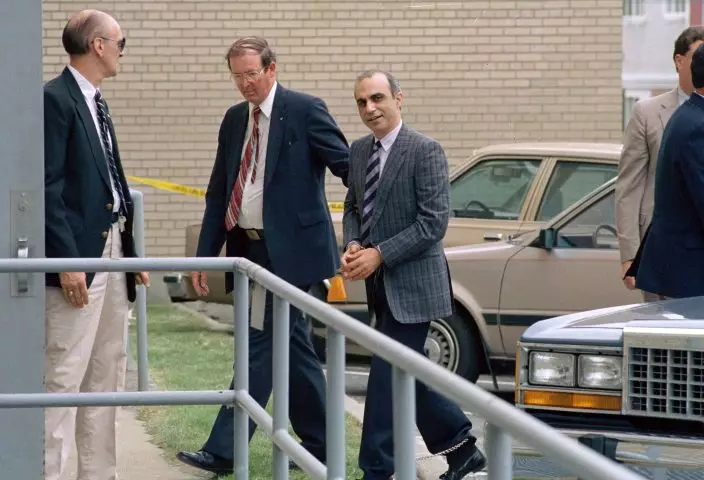
FILE - In this June 22, 1988 file photo, Walid Kabbani, right, one of three defendants of Lebanese descent from Montreal, Canada, is led into federal court in handcuffs in Burlington, Vt. Kabbani and the two others were caught smuggling the makings of a bomb into the U.S., on Oct. 23, 1987, in Richford, Vt. All three were convicted and sent to federal prison. (AP PhotoToby Talbot, File)
On the Canadian border, Ahmed Ressam was caught by border agents in December 1999 after he tried to enter the United States at Port Angeles, Washington, with bomb components in the trunk of his car. It was later determined Ressam planned to attack the Los Angeles airport during the millennium.
"The evidence shows that if we are going to talk about terrorism, there is actually good reason to think more carefully about the U.S.'s northern border than the U.S.'s southern border," said Emily Gilbert, a terrorism expert and director of the Canadian studies program at the University of Toronto.
The U.S.-Canadian border is over 5,500 miles (8,900 kilometers) long, more than 2½ times the length of the U.S. border with Mexico, and is crossed by numerous roads and railroad tracks, with many wide-open stretches. In Richford, the border cuts through farm fields and forests with occasional granite markers in the ground.
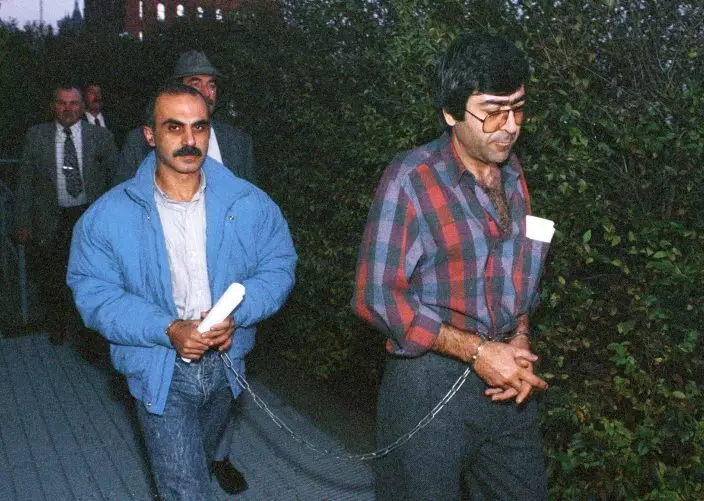
FILE - In this Oct. 28, 1987 file photo, two of three Canadians of Lebanese descent are led into federal court in Burlington, Vt. Walid Nicolas Kabbani, left, and Walid Mourad were caught with a third accomplice smuggling the makings of a bomb into the U.S., on Oct. 23, 1987, in Richford, Vt. All three were convicted and sent to federal prison. (AP PhotoToby Talbot, File)
Worries about terrorists crossing from Canada have been reduced by the close cooperation between the two countries, and security has been tightened since 9/11. Hundreds more Border Patrol agents are stationed along the border (authorities won't disclose the total), surveillance has been enhanced with such things as electronic sensors and helicopters, and those trying to cross the border must show a passport or certain other documents, none of which were required before Sept. 11, 2001.
In the Richford incident, Walid Kabbani was seized at the border, and his two accomplices in the van were arrested at a local hotel the morning after. U.S. authorities said the three men, Lebanese-born Canadians from Montreal, were members of an extremist group responsible for the 1982 assassination of Lebanese President-elect Bashir Gemayel.
Federal officials were never able to say for sure what their intended target was. All three were convicted or pleaded guilty to explosives and immigration violations and went to prison, getting out in the 1990s.
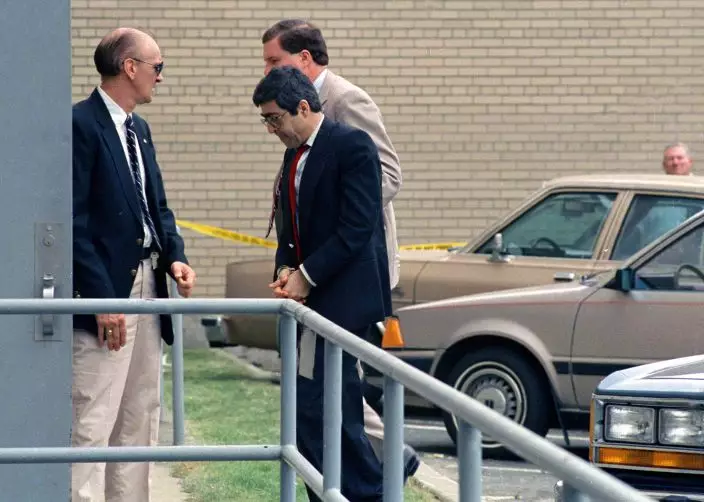
FILE - In this June 22, 1988 file photo, Walid Mourad, center, one of three defendants of Lebanese descent from Montreal, Canada, is led into federal court in handcuffs in Burlington, Vt. Mourad and the two others were caught smuggling the makings of a bomb into the U.S., on Oct. 23, 1987, in Richford, Vt. All three were convicted and sent to federal prison. (AP PhotoToby Talbot, File)
Terrorism was the last thing on Jewett's mind when he became police chief in the border town, which has around 2,300 people and is about 2,000 miles from the Mexican border. He said the current debate about a border wall with Mexico and the recent 35-day government shutdown it provoked has gone too far.
"I do also understand we need some protections on our borders. And I just don't know what it is," Jewett said. "It's hard."
AP researcher Rhonda Shafner in New York contributed to this report.
PORT-AU-PRINCE, Haiti (AP) — U.S. Secretary of State Antony Blinken arrived Thursday in Haiti to reaffirm the U.S. government’s commitment to a multinational mission to fight gangs in the Caribbean country and push for long-awaited general elections as he supported consideration of a peacekeeping operation.
Some 400 Kenyan police have been deployed to Haiti to lead a U.N.-backed mission to quell gang violence in the Haitian capital and beyond, but concerns have grown that the mission lacks resources.
“At this critical moment, we do need more funding, we do need more personnel to sustain and carry out the objectives of this mission,” Blinken told reporters.
He added that the U.S. is working to renew the mission, “but we also want to make sure that we have something that’s reliable, that’s sustainable. We’ll look at every option to do that. A peacekeeping operation would be one such option.”
On Wednesday, Brian Nichols, U.S. assistant secretary for Western Hemisphere affairs, confirmed the U.S. government is considering a U.N. peacekeeping operation as one way to secure money and resources to fight gangs that control 80% of Haiti’s capital.
Many Haitians have rejected the proposal of another peacekeeping operation, given the introduction of cholera and sexual abuse cases that occurred when U.N. troops were last in Haiti.
Blinken arrived a day after Haiti’s government extended a state of emergency to the entire country. It had been imposed earlier in the year in the capital and surrounding areas in an attempt to stem the ongoing violence.
Blinken met with Haitian Prime Minister Garry Conille and a nine-member transitional presidential council that was created after former Prime Minister Ariel Henry resigned. He also met with unspecified political party leaders, the head of the multinational mission and the chief of Haiti’s National Police.
He said the discussions centered in part on how to ensure that security personnel are well-trained, well=equipped and held accountable, adding that there's a “clear plan” on the mission's next steps. Talks also focused on the need to hold general elections.
“That is the critical next step,” he said. “We want to make sure Haiti is back on a clear democratic track.”
Haiti last held elections in 2016, and officials since then have blamed gang violence and political upheaval for preventing them from holding new ones.
In July 2021, former President Jovenel Moïse was assassinated, and gang violence since then has surged. In February, gangs launched coordinated attacks on police stations and the main international airport, which remained closed for nearly three months. They also stormed Haiti’s two largest prisons, releasing more than 4,000 inmates.
The violence subsided somewhat before the first contingent of Kenyan police arrived in late June, with Blinken noting that economic activity has restarted in some areas of Port-au-Prince, and that joint operations have led to successes including regaining control of Haiti's biggest public hospital.
However, gangs continue to attack communities surrounding Port-au-Prince.
“Taking back the streets from gangs is critical,” Blinken said.
After meeting with officials in Haiti, Blinken is scheduled to fly Thursday night to the Dominican Republic, which shares the island of Hispaniola with Haiti.
On Friday, he is scheduled to meet with Dominican President Luis Abinader and other officials before returning to the U.S. later that day.
Nichols said the talks with Abinader will focus on three priorities: strengthening economic ties, advancing values including respect for human and labor rights and promoting increased security in the region, especially in Haiti.
Abinader has come under fire in recent years for his administration’s treatment of Haitian migrants and those born in the Dominican Republic to Haitian parents.
He also has largely closed the airspace with Haiti and is building a wall between the two nations.
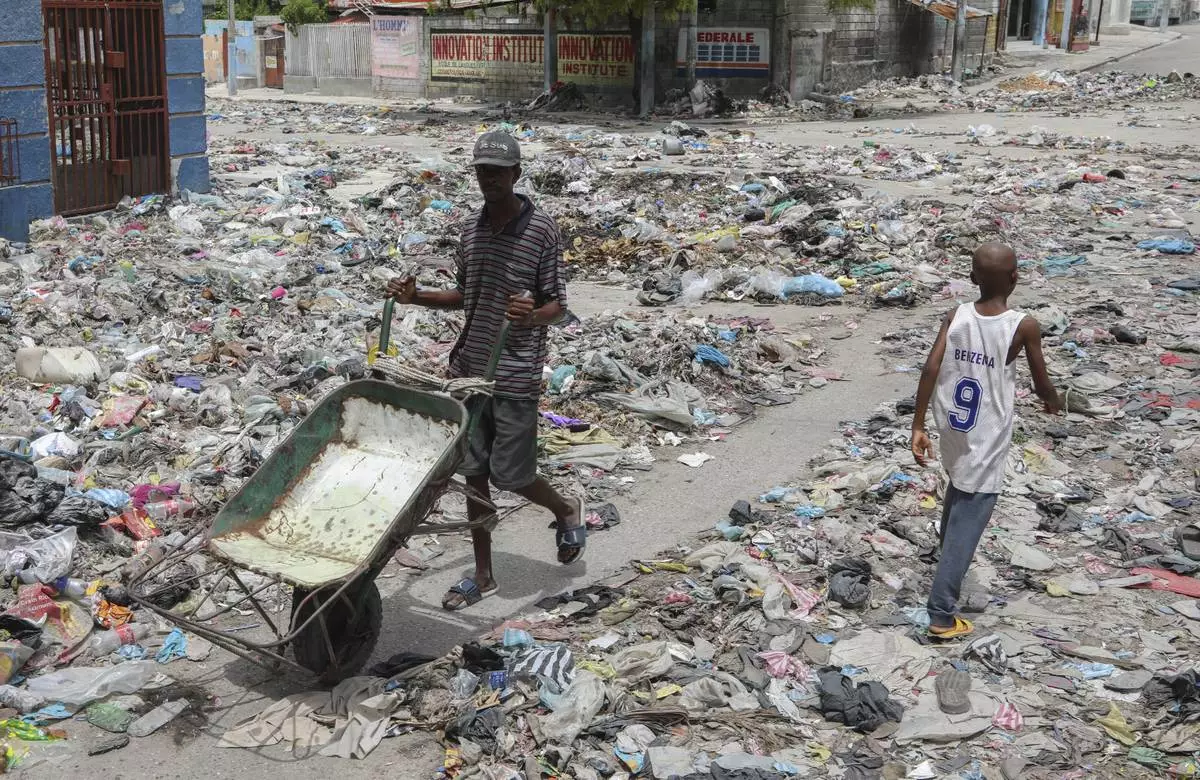
People walk down a street covered with trash in downtown Port-au-Prince, Haiti, Thursday, Sept. 5, 2024. (AP Photo/Odelyn Joseph)
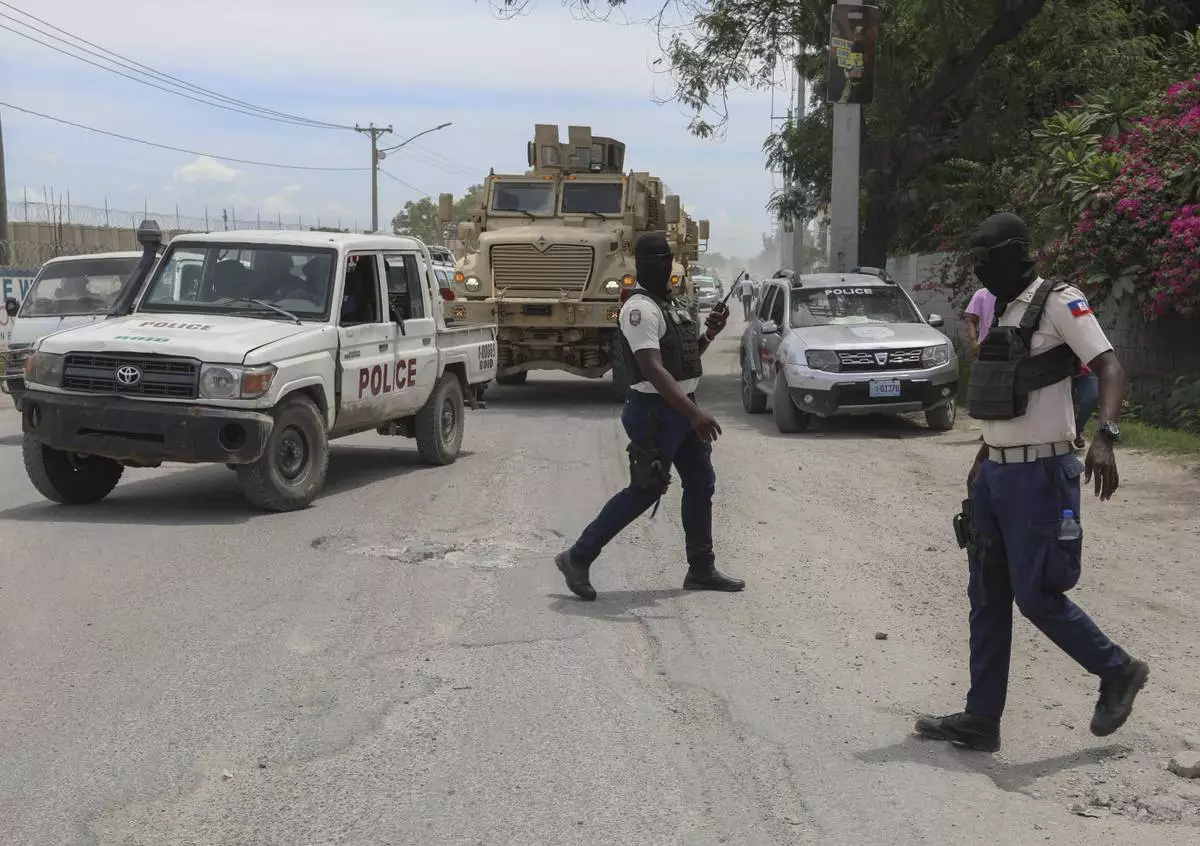
Police officers patrol a street near the airport in Port-au-Prince, Haiti, Thursday, Sept. 5, 2024. (AP Photo/Odelyn Joseph)
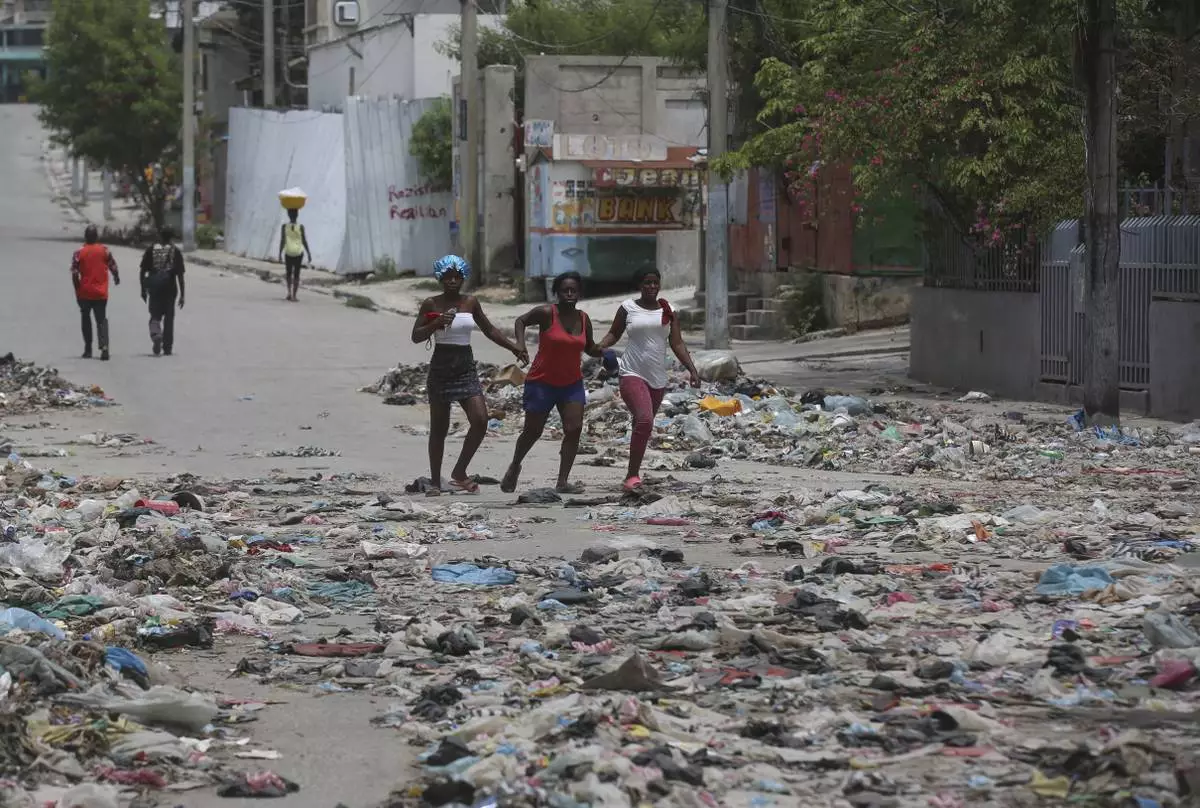
People walk down a street covered with trash in downtown Port-au-Prince, Haiti, Thursday, Sept. 5, 2024. (AP Photo/Odelyn Joseph)
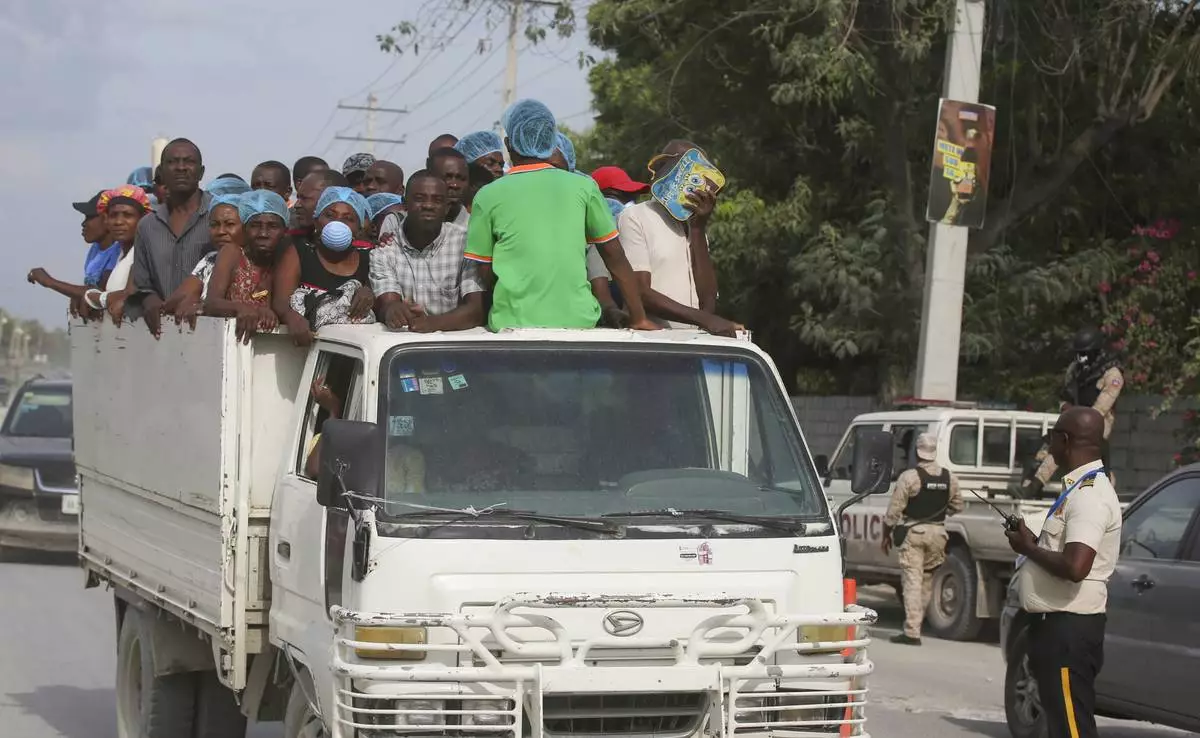
A truck drives past a police officer standing guard outside the airport in Port-au-Prince, Haiti, Thursday, Sept. 5, 2024. (AP Photo/Odelyn Joseph)
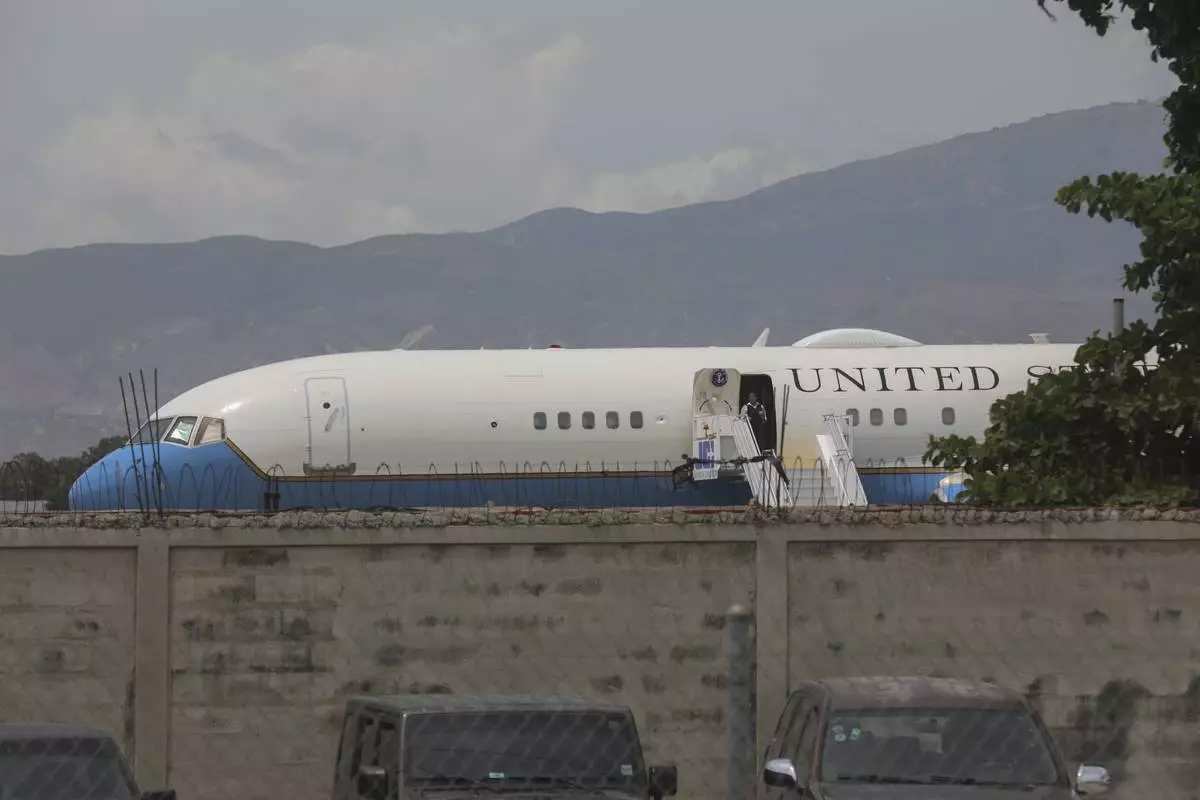
The plane that carried U.S. Secretary of State Antony Blinken arrives at Toussaint Louverture International Airport in Port-au-Prince, Haiti, Thursday, Sept. 5, 2024. (AP Photo/Odelyn Joseph)
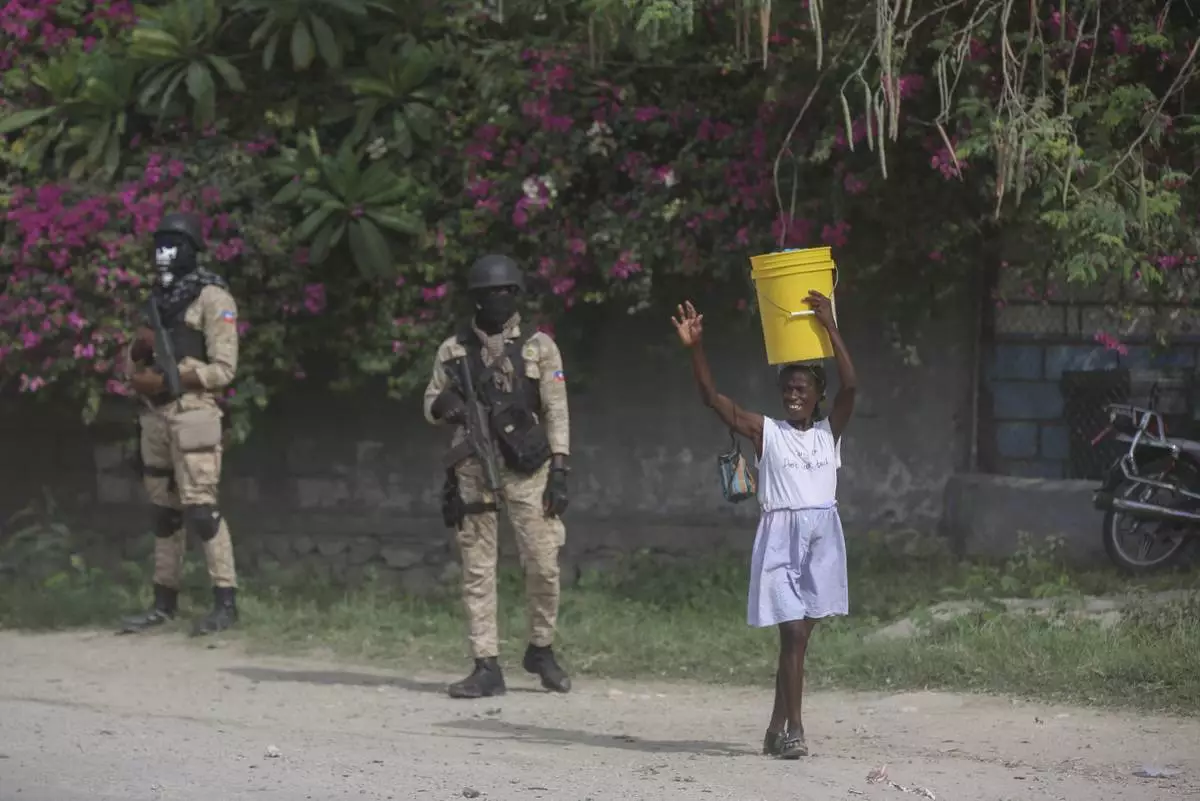
A street vendor walks past police officers ahead of the arrival of U.S. Secretary of State Antony Blinken in Port-au-Prince, Haiti, Thursday, Sept. 5, 2024. (AP Photo/Odelyn Joseph)
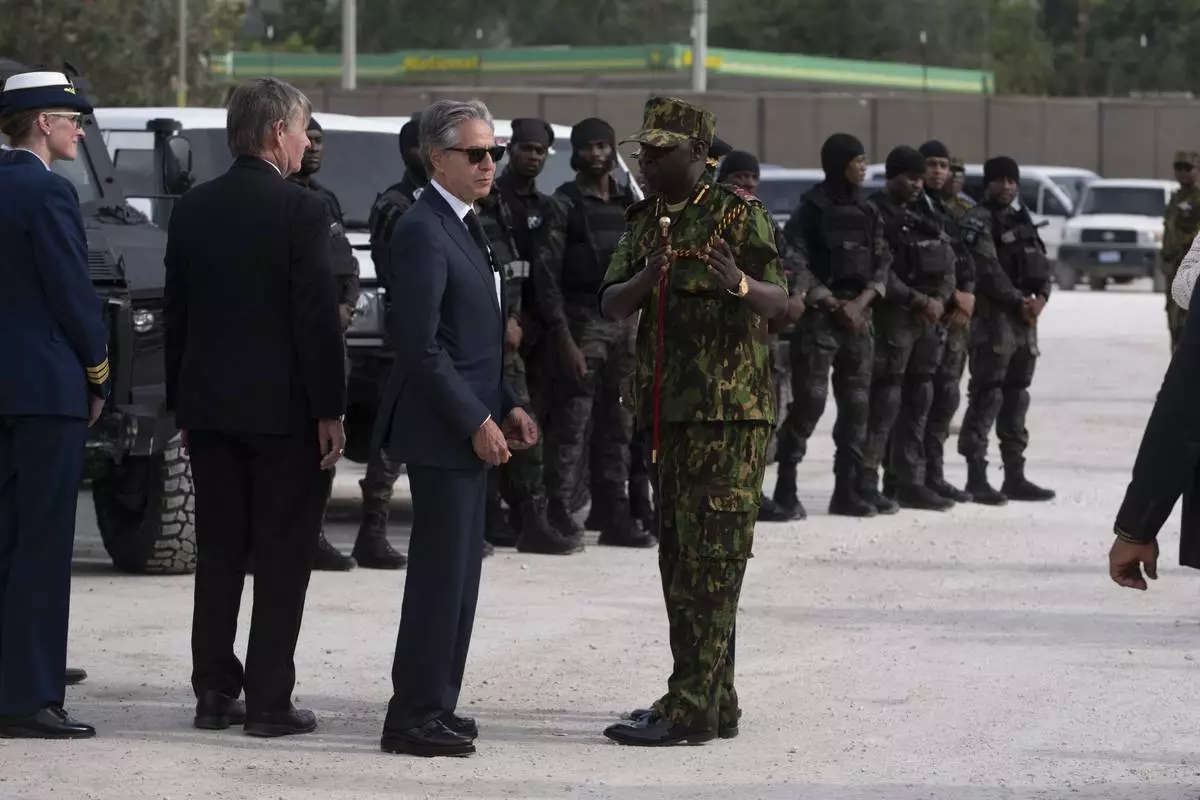
U.S. Secretary of State Antony Blinken, in sunglasses, speaks with Commander of the Multinational Security Support Mission Commander Godfrey Otunge in Port-au-Prince, Haiti, Thursday, Sept. 5, 2024. (Roberto Schmidt/Pool photo via AP)
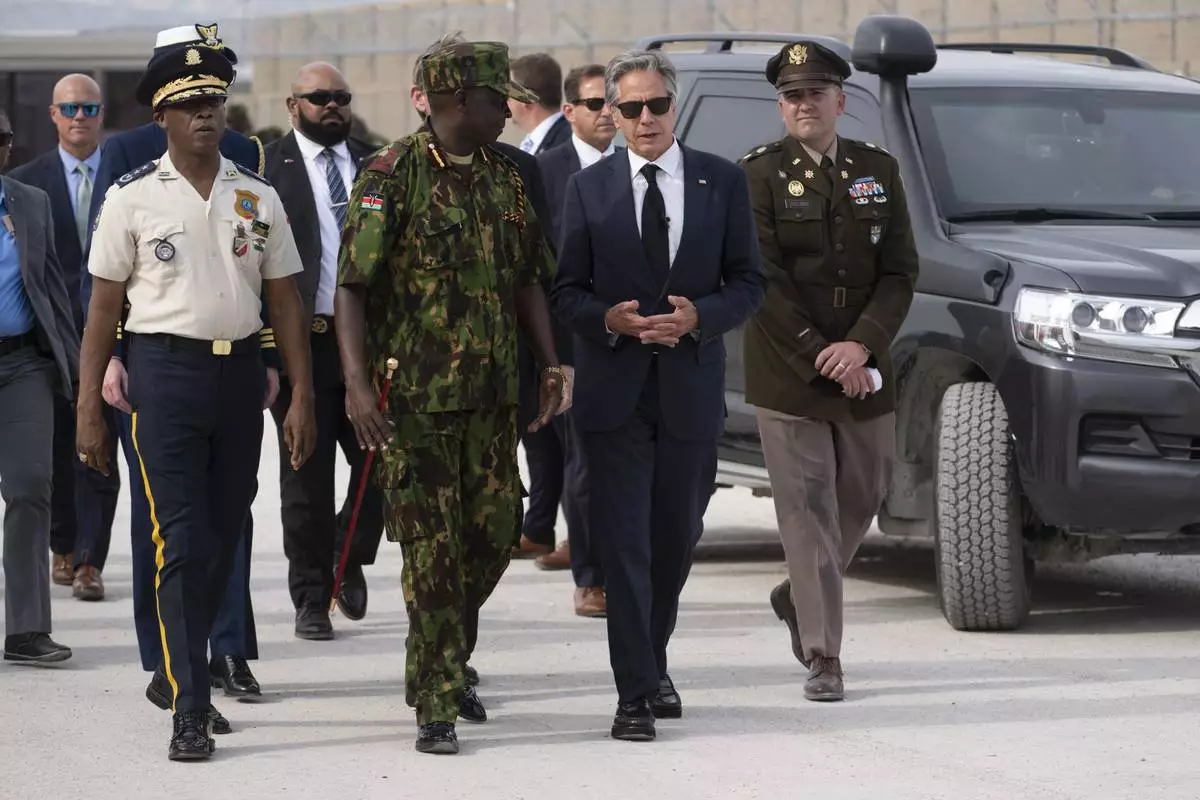
U.S. Secretary of State Antony Blinken, in sunglasses, and Commander of the Multinational Security Support Mission Commander Godfrey Otunge chat at the MSS base in Port-au-Prince, Haiti, Thursday, Sept. 5, 2024. (Roberto Schmidt/Pool photo via AP)
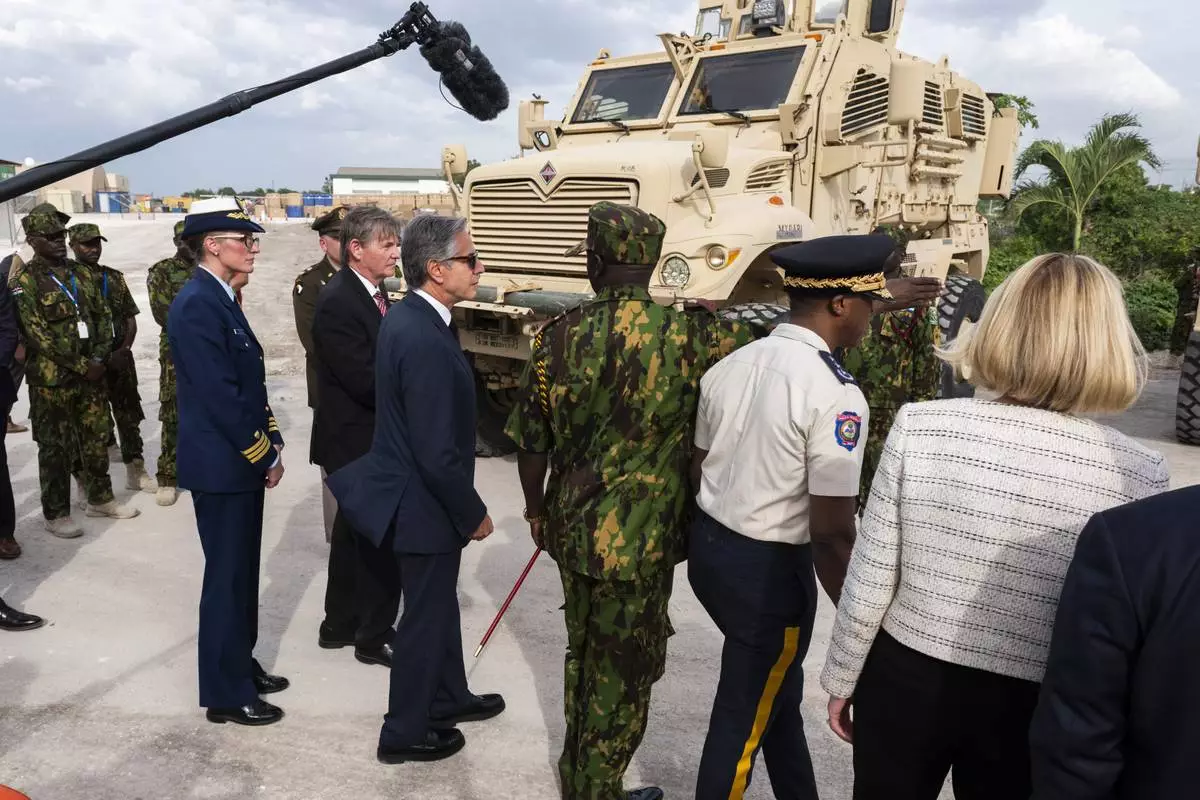
Commander of the Multinational Security Support Mission Commander Godfrey Otunge, third from right, shows U.S. Secretary of State Antony Blinken, fourth from right, armored vehicles the U.S. government donated at the MSS base in Port-au-Prince, Haiti, Thursday, Sept. 5, 2024. (Roberto Schmidt/Pool photo via AP)
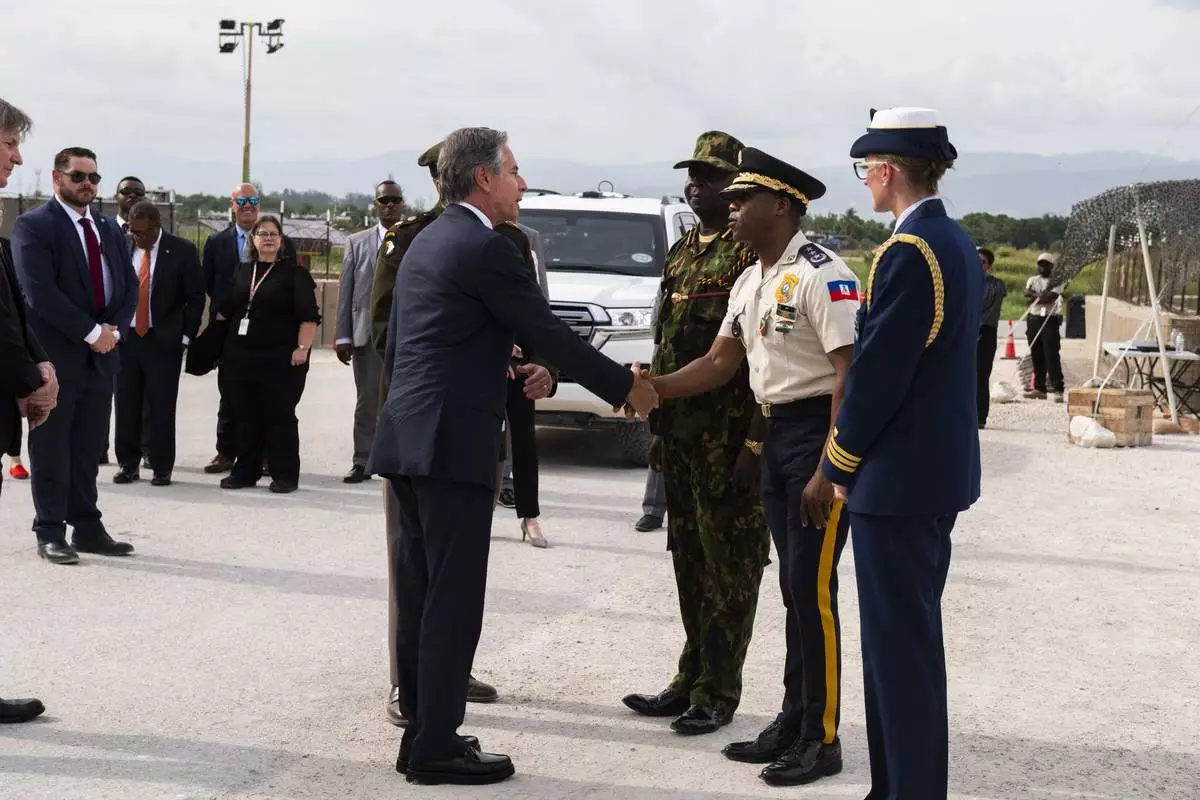
US Secretary of State Antony Blinken, left, greets the Haitian National Police General Director Rameau Normal upon arriving at the MSS base for a meeting in Port Au Prince, Haiti, Thursday, Sept. 5, 2024. (Roberto Schmidt/Pool photo via AP)
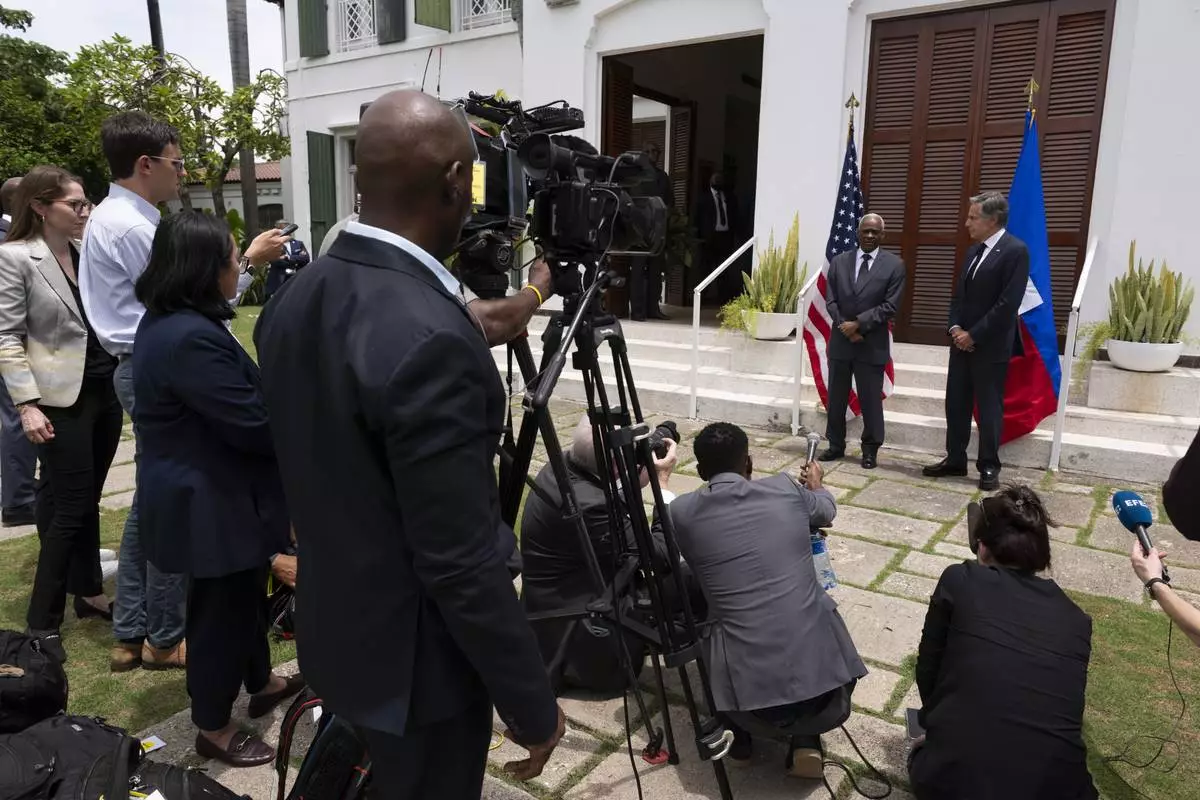
U.S. Secretary of State Antony Blinken, right, and Haitian Transitional Presidential Council Coordinator Edgard Leblanc Fils speak to the press at the U.S. Chief of Mission Residence in Port-au-Prince, Haiti, Thursday, Sept. 5, 2024. (Roberto Schmidt/Pool photo via AP)
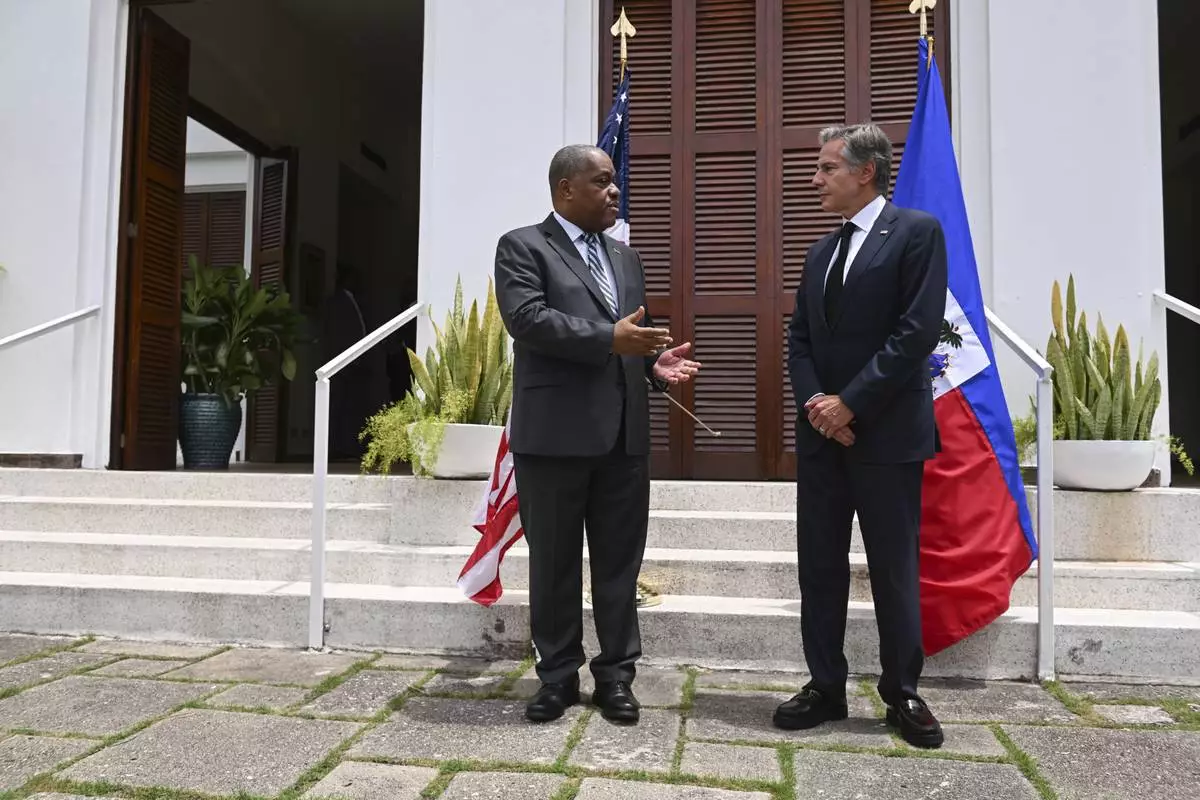
Haitian Prime Minister Garry Conille, left, and U.S. Secretary of State Antony Blinken speak to the press at the U.S. Chief of Mission Residence in Port-au-Prince, Haiti, Thursday, Sept. 5, 2024. (Roberto Schmidt/Pool photo via AP)
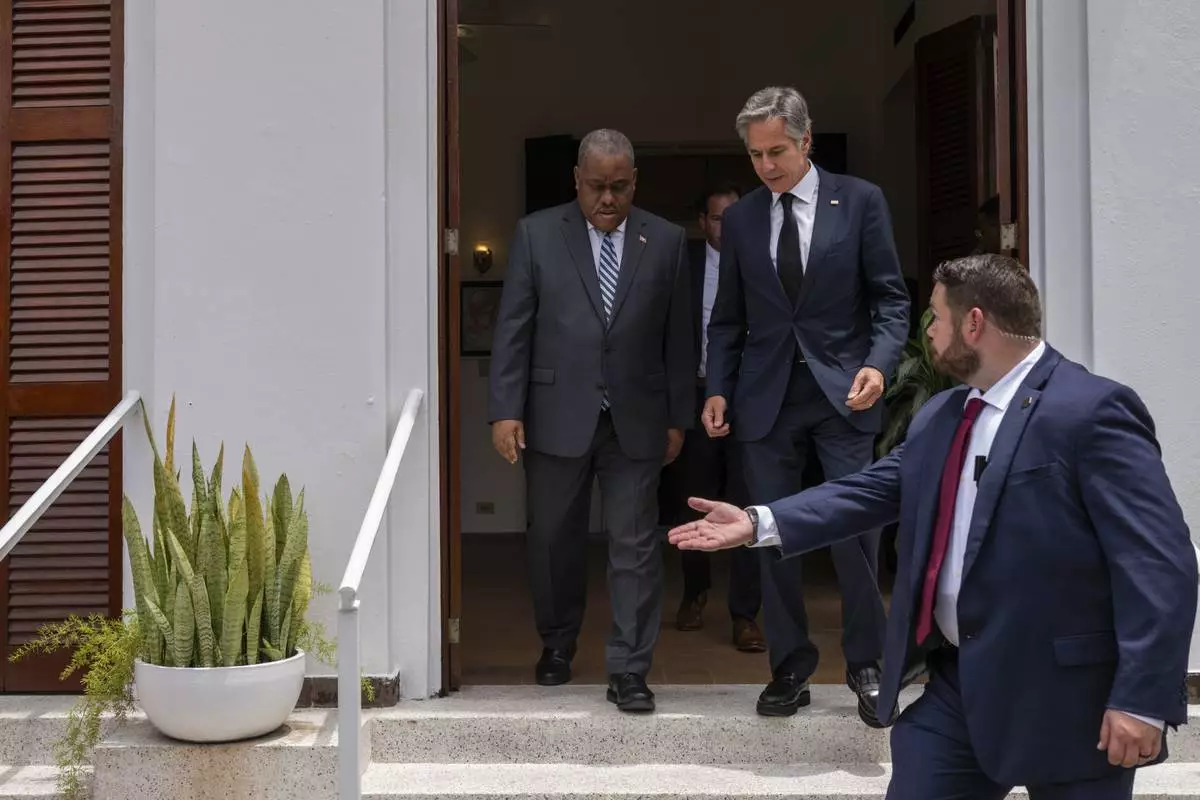
U.S. Secretary of State Antony Blinken, top right, and Haitian Prime Minister Garry Conille arrive to speak to the press at the U.S. Chief of Mission Residence in Port-au-Prince, Haiti, Thursday, Sept. 5, 2024. (Roberto Schmidt/Pool photo via AP)
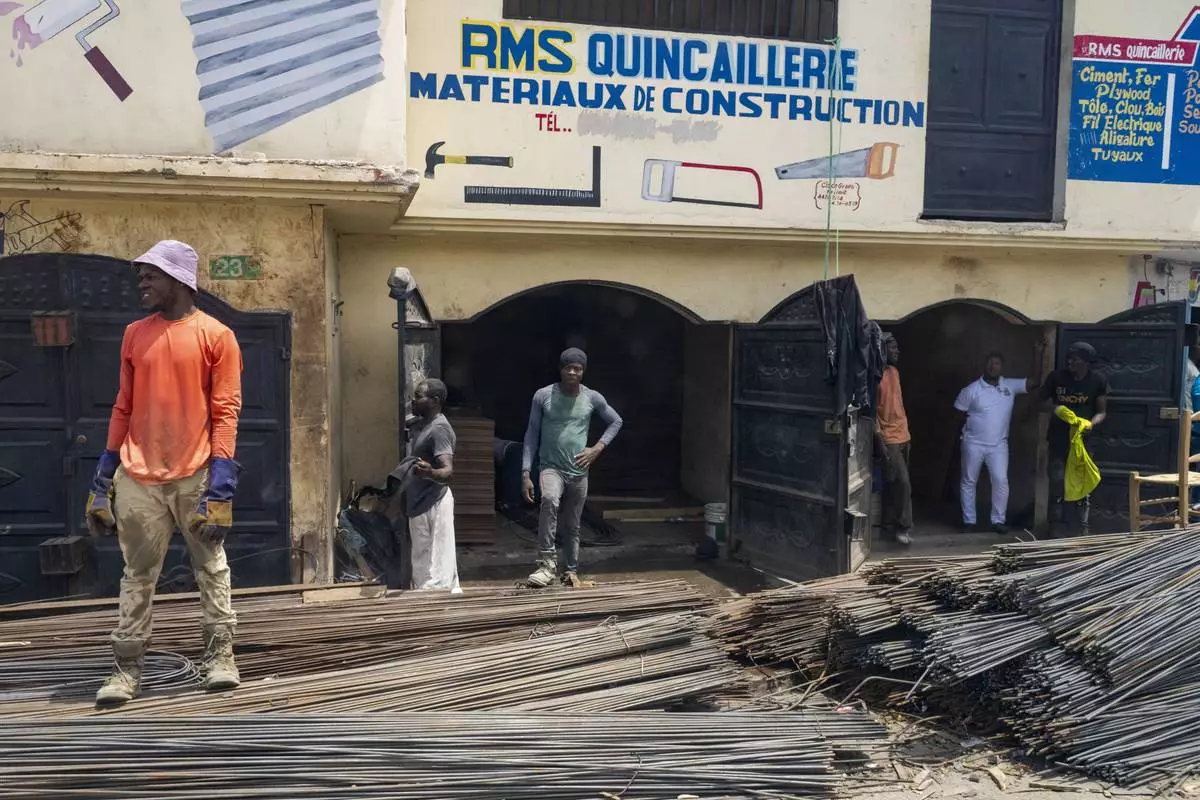
People watch the motorcade of U.S. Secretary of State Antony Blinken in Port-au-Prince, Haiti, Thursday, Sept. 5, 2024. (Roberto Schmidt/Pool photo via AP)
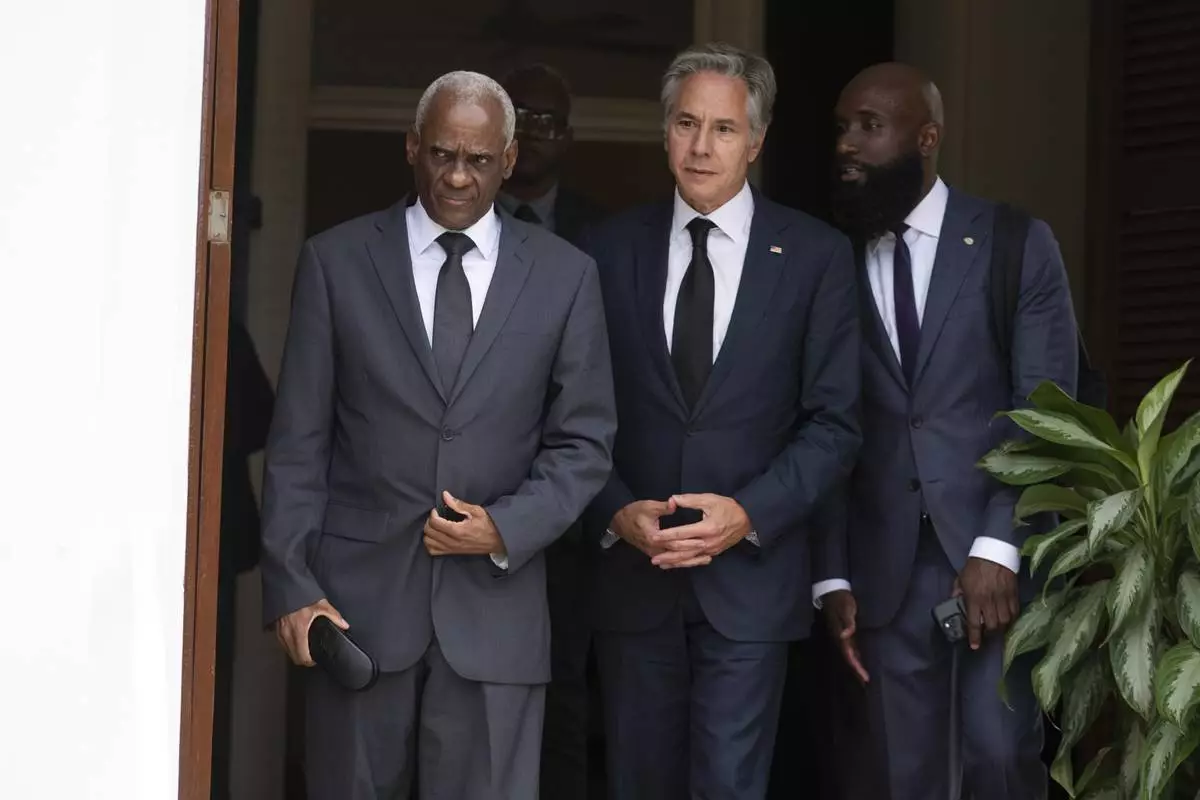
U.S. Secretary of State Antony Blinken, center, and Haitian Transitional Presidential Council Coordinator Edgard Leblanc Fils, left, arrive to speak to the press at the U.S. Chief of Mission Residence in Port-au-Prince, Haiti, Thursday, Sept. 5, 2024. (Roberto Schmidt/Pool photo via AP)
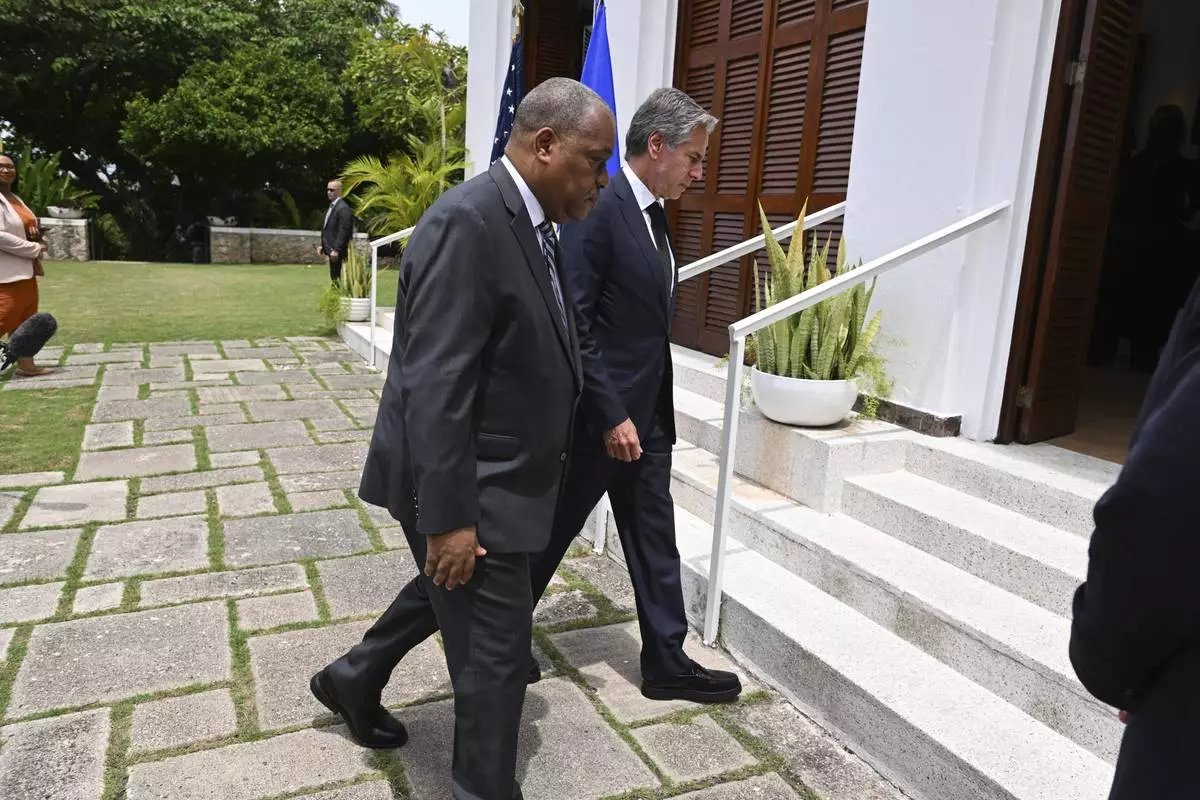
Haitian Prime Minister Garry Conille, front, and U.S. Secretary of State Antony Blinken enter the U.S. Chief of Mission Residence after speaking to the press in Port-au-Prince, Haiti, Thursday, Sept. 5, 2024. (Roberto Schmidt/Pool photo via AP)
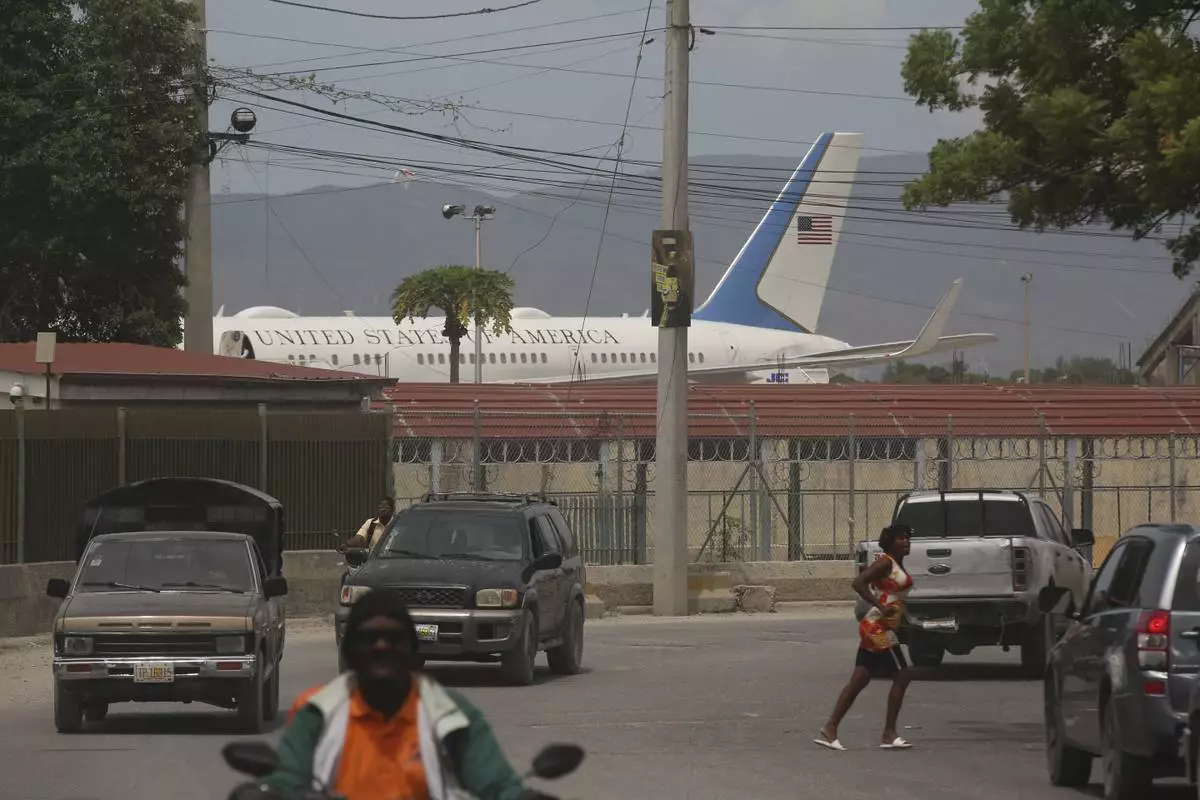
A plane that carried U.S. Secretary of State Antony Blinken arrives at Toussaint Louverture International Airport in Port-au-Prince, Haiti, Thursday, Sept. 5, 2024. (AP Photo/Odelyn Joseph)
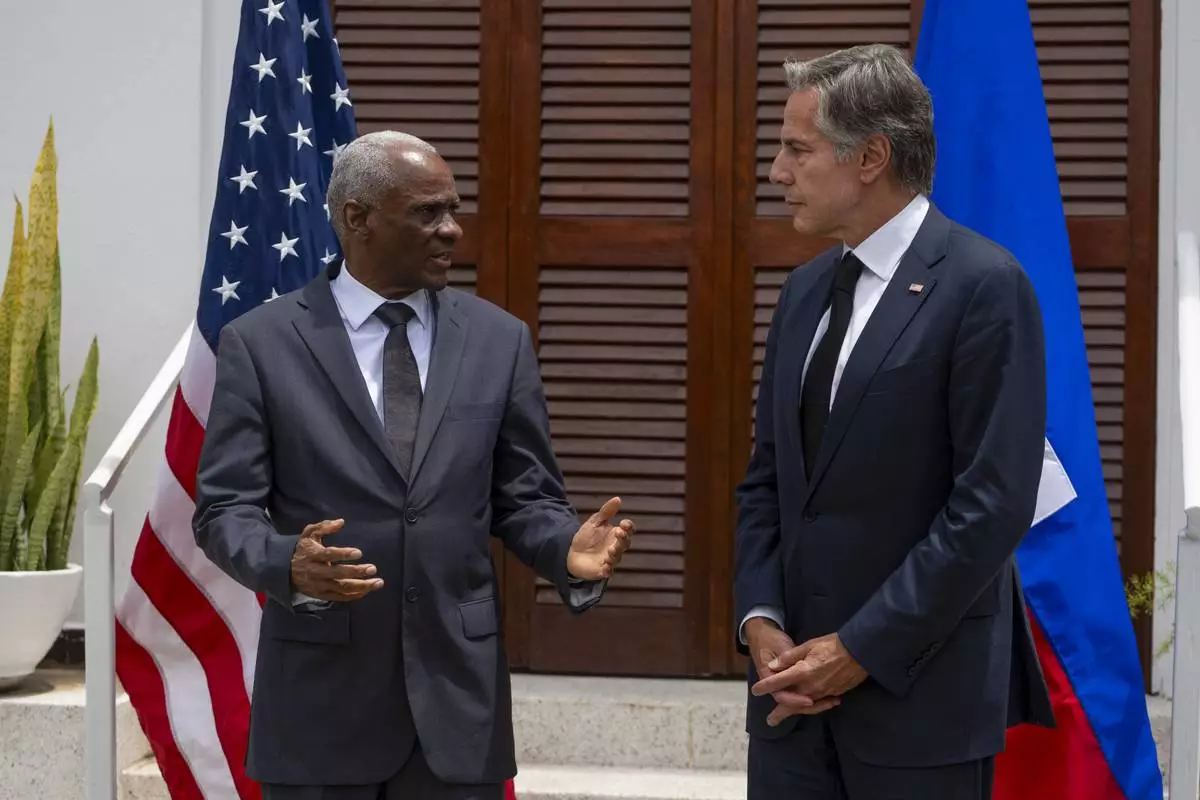
U.S. Secretary of State Antony Blinken, right, and Haitian Transitional Presidential Council Coordinator Edgard Leblanc Fils speak to the press at the U.S. Chief of Mission Residence in Port-au-Prince, Haiti, Thursday, Sept. 5, 2024. (Roberto Schmidt/Pool photo via AP)
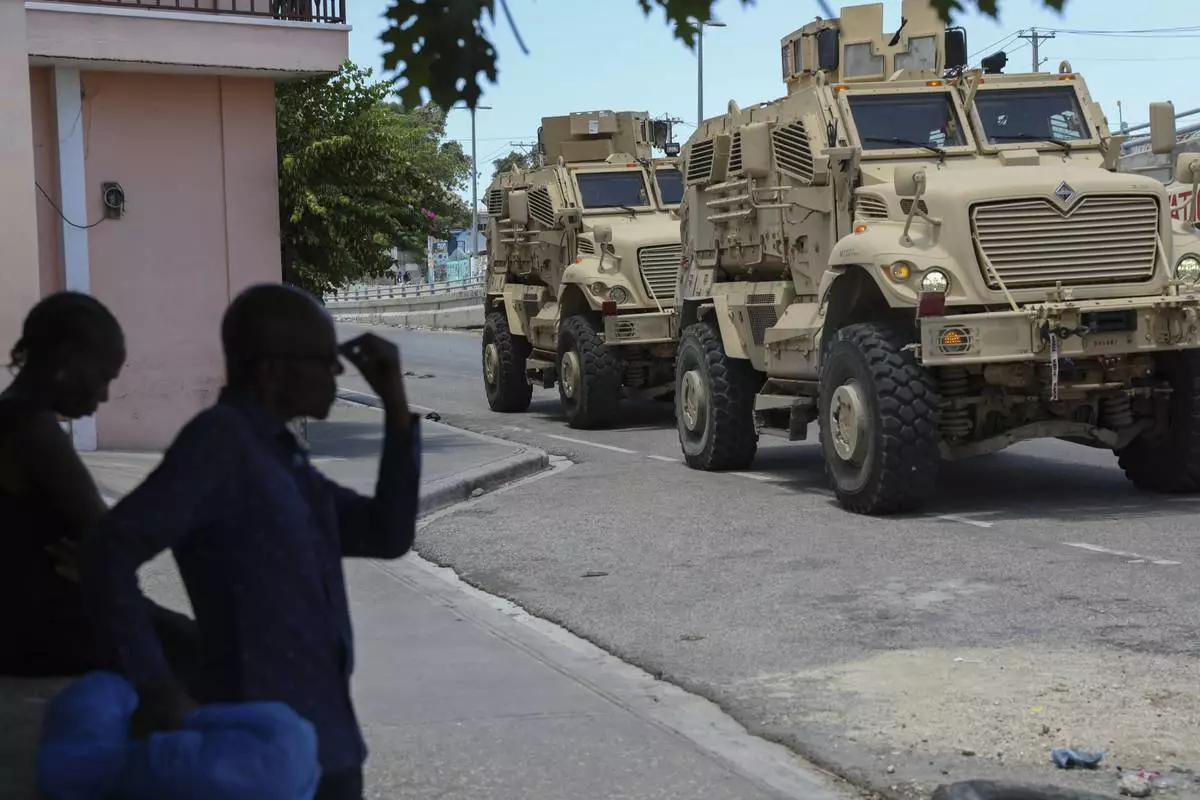
Kenyan police officers, part of a UN-backed multinational force, drive past residents in armored vehicles on the streets of Port-au-Prince, Haiti, Wednesday, Sept. 4, 2024. (AP Photo/Odelyn Joseph)
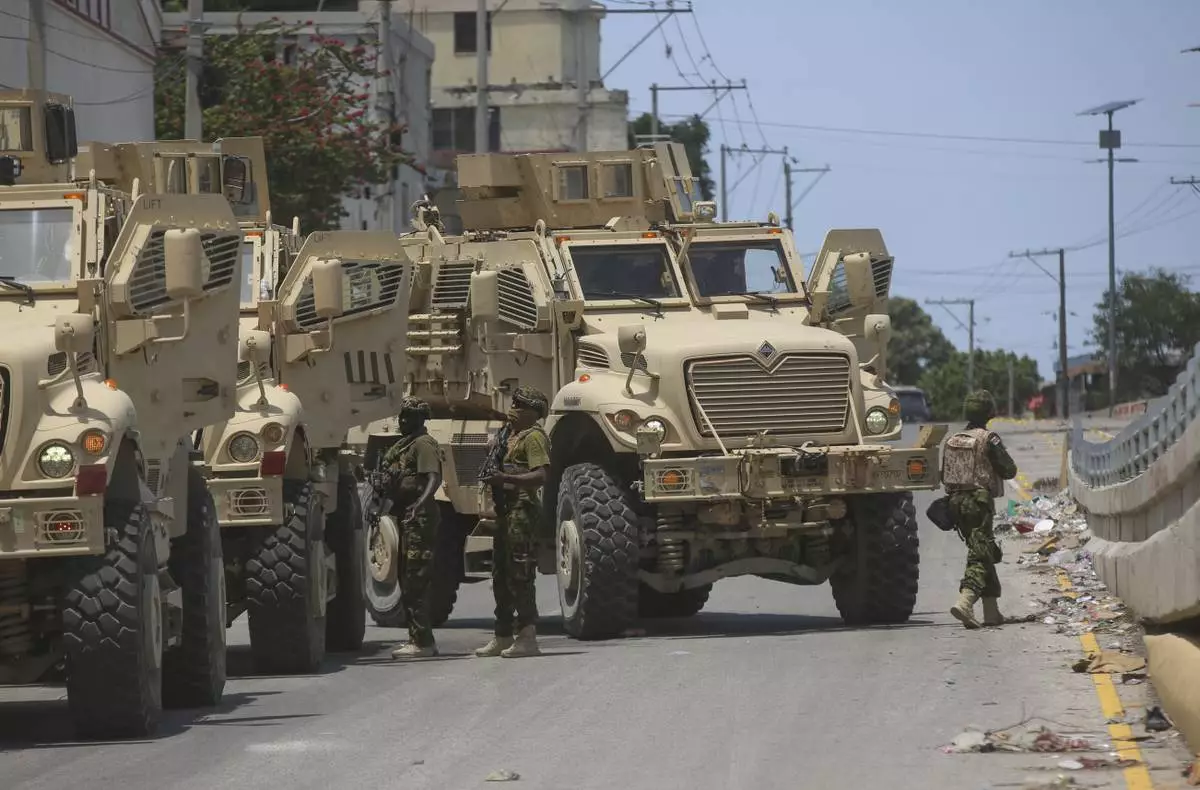
Kenyan police officers, part of a UN-backed multinational, work to tow away a broken down armored car during an operation in the Delmas neighborhood of Port-au-Prince, Haiti, Wednesday, Sept. 4, 2024. (AP Photo/Odelyn Joseph)
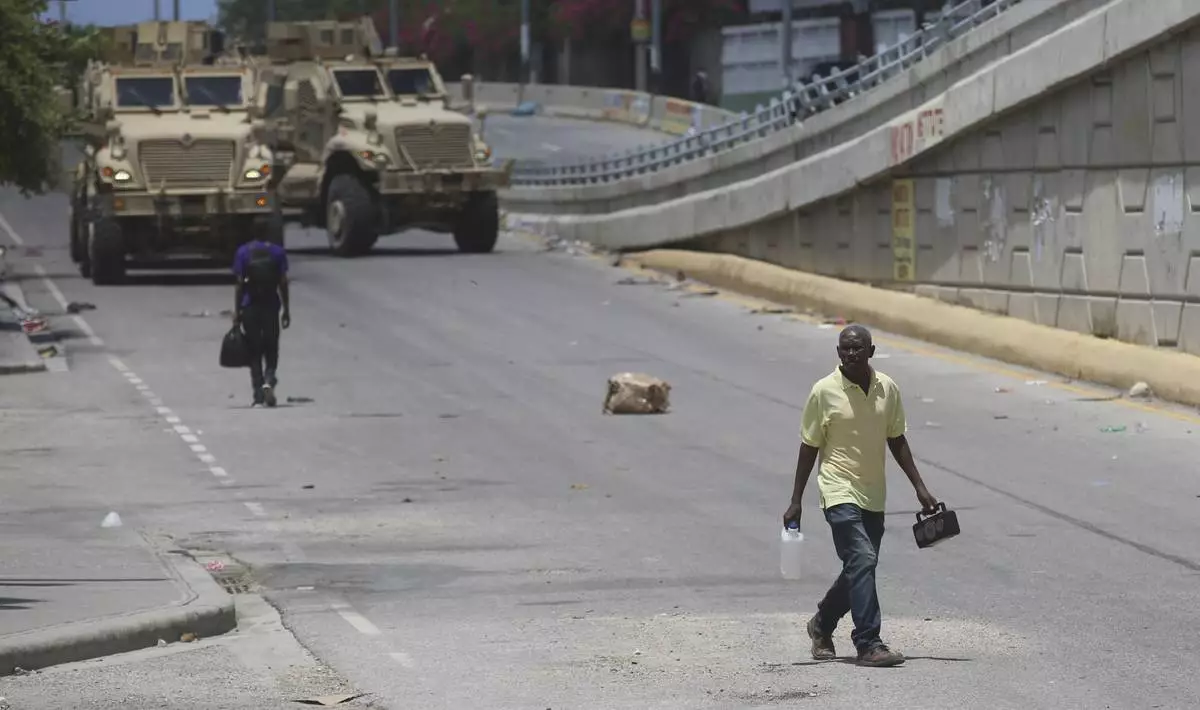
A man walks near armored vehicles of Kenyan police officers part of a UN-backed multinational in Port-au-Prince, Haiti, Wednesday, Sept. 4, 2024. (AP Photo/Odelyn Joseph)































